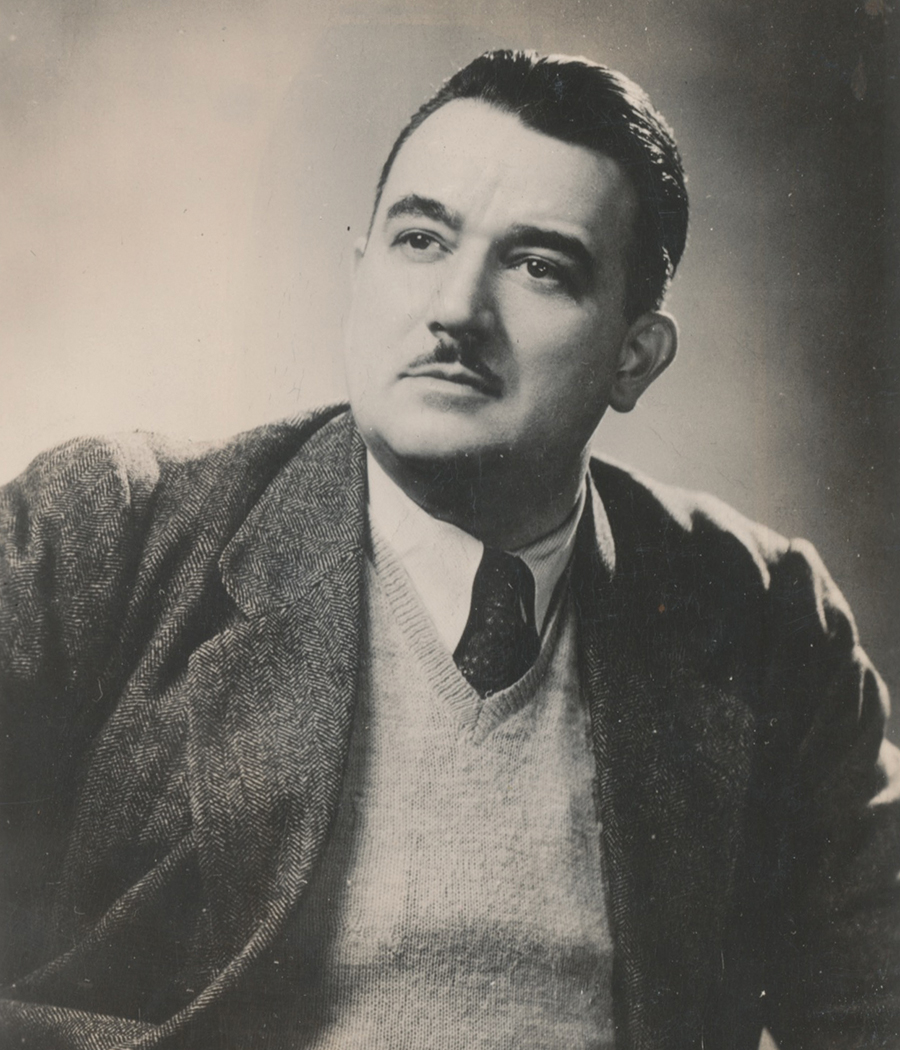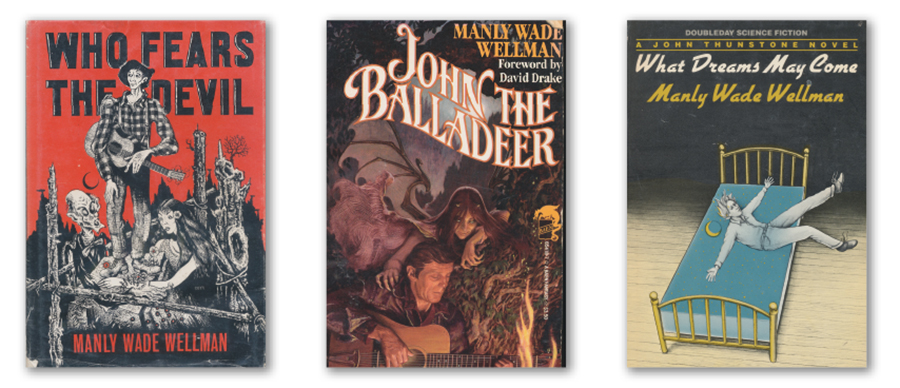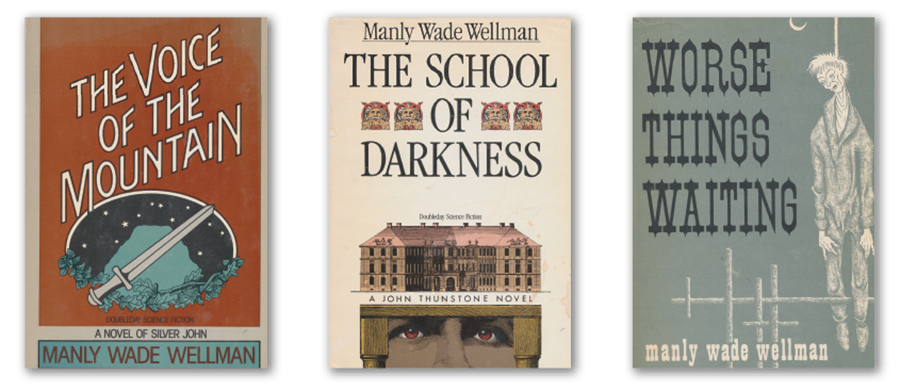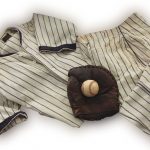
The Bard of Pinebluff
Manly Wade Wellman,
our forgotten man of letters
By Stephen E. Smith
On a September afternoon 53 years ago, I was one of eight creative writing students who had gathered for the first time in room 301 of the Carlton Building on the campus of little Elon College. We were awaiting the arrival of our instructor, an adjunct professor unknown to me. A fellow student who was repeating the course offered a concise appraisal: “This guy has published a truckload of books.” And at that moment an imposing figure appeared in the doorway.
Manly Wade Wellman was 6 feet tall, barrel-chested and wide-shouldered. He appeared to be in his mid-60s, with graying hair combed neatly back from his broad forehead. His face was round, open, accentuated with heavy eyebrows and a prominent nose below which was cultivated a tweedy Clark Gable mustache. I noticed immediately the peculiar way in which his eyes reflected light. The very tops of his irises flickered, suggesting an authentic inner illumination. He was dressed neatly in a frayed sports jacket that matched his mustache. A glasses case was stuffed in the pocket of his shirt, the collar of which was pulled tight by a bolo tie clasped with a silver and turquoise medallion.

“I’m Manly Wade Wellman!” he announced, surveying the anxious faces staring up at him. Then he launched into a story that went something like this: When Manly’s father was a boy of 8, he was taken by his father to attend a lecture by Mark Twain. Father and son found seats in the front row of the auditorium, and when the lights came up, the illustrious raconteur stepped to the edge of the stage and removed a folded paper from the inside pocket of his white linen jacket.
“I would like to read a poem,” Twain announced. The audience, who had not gathered to hear America’s foremost humorist read a poem, was silent for a moment, then burst into laughter. Annoyed, Twain held up his hand. “No,” he said, “this is a serious poem.” Again, the audience laughed. Twain frowned, crumpled up the paper, and tossed it onto the stage, where it remained until he had concluded his lecture. According to Manly, his father spent the evening staring at the wadded-up poem, and at the conclusion of the lecture, he was taken by the hand and led from the hall, thus consigning to the dustbin what may have been a priceless scrap of American literature.
More than half a century later my initial impression of Manly and the story he told during that first class session remains with me, long after the yarns of other teachers, friends and fellow writers, accomplished storytellers all, have faded from memory. Manly no doubt intended the story to serve as an analogous revelation, but what I recall most vividly are the sensuously effective images: that long-ago evening when the romantic possibility of a white-haired Twain still existed in America, the irreverent audience, that small boy longing to rescue the Great Lost American Poem, all of it spun forth in Manly’s raspy baritone, rising and falling with modulations of passion, poignancy, and a lingering trace of regret. He grumbled his way through the description, exposition and complications, all elaborately embroidered, and when he arrived at the story’s obvious climax, his voice rose suddenly to a crescendo.
“What would I give to know what was written on that scrap of paper?” he roared. “If only my father had reached out to grab it!” — and Manly’s left hand, which I noticed was stunted, the ring finger and pinky withered, suddenly darted out to grab the metaphysical poem. And there it was: almost everything I’d need to know about structuring a narrative.
This was, of course, a well-worn tale, polished and perfected with many tellings — for Manly Wellman, was, first and foremost, a teller of tales, a believer in recreating the moment in words and images. He was also a genuine artist, and the effect was calculated. It was his purpose to communicate in a sequence of rich, concise images so vivid as to be indelible on the impressionable mind. And, in my case, he was successful. I recall at least two later occasions when Manly offered the same story in which he changed minor details to better suit the occasion. Each telling offered fresh particulars and new insights that served to enliven the narrative. Like all accomplished writers, Manly was always in the process of rehearsing and revising, and I took note of the most important lesson a writer can learn — revise, revise, revise.
When class was dismissed, I beelined it to the library and looked up Manly Wade Wellman in Books in Print. My fellow student had been correct — Manly’s books occupied a couple of pages of the reference work. From there I wandered into the stacks and ran my index finger along the spines of 10 or 15 glossy covers with “Wellman” printed in big letters. I selected Not at These Hands, a mainstream, slick-covered novel published by Putnam, a big-deal New York house, and checked it out. I read the bio information on the dust jackets of several other books, mostly science fiction and fantasy, and learned that Manly had been born in Portuguese West Africa in 1903, and that he had ancestry that reached back through the Civil War to Colonial Virginia. He’d lived in Utah, New York and three or four other states, but he’d never stayed in one place for long until he settled in North Carolina after World War II. One of the bios identified Pinebluff, N.C. — wherever that was — as his family home.
His books included biographies — he’d written Giant in Gray, the definitive work on Confederate General Wade Hampton — and there were regional histories, juveniles, mystery novels, science fiction and fantasy. He’d published hundreds of stories in pulps in the ’30s, including more than 50 stories in the legendary Weird Tales, and he’d bested Faulkner in the 1946 Ellery Queen Mystery Magazine Prize. When it came to writing, he was indeed a jack-of-all-trades. I was duly impressed. Who could ask for a more experienced teacher? Or as it turned out, a better one?
Manly Wellman was fiercely proud of his stature as a writer. “Outlaws,” he called us, generously including his students in the designation, and he had the rare ability, from the moment he stepped into the room, to instill in each student the strong belief in self that made him a successful writer and a charismatic presence.
Each Tuesday morning that semester, I’d drop a story in the campus mail, and Manly would critique and correct it and hand it back after reading it aloud to the class. I was no doubt an annoyingly eager student, and on a couple of occasions I submitted two stories in one week. “You’re like the tiger who’s tasted blood,” Manly laughed — and in fact, I was spending entirely too much study time writing fiction. Not all my stories were keepers, but one was good enough to win a state-wide short story contest that earned me $100 and a magazine publication. When I met with Manly after winning the magazine prize, he asked what my major was. I told him it was sociology. “Change your major to English!” he barked. “There’s no such thing as sociology!”
The class met in a tall-windowed seminar room tucked away in a forsaken corner of the campus. No other classes met on that hall, and we felt we were truly in hiding. We loved being Manly’s “outlaws,” and he lavished attention on each student, managing to be critical while encouraging the better writer within. Every story he returned included a personal note banged out on an old portable, ribbon-weary Royal Quiet Deluxe he toted with him everywhere.
Today, leafing through the yellowing pages of the crude stories I wrote that semester, I find Manly’s corrections, suggestions, rebukes and flattery everywhere scribbled in the margins and between the lines. One of his notes reads in part: “In its organization and the early stages of its writing, it (my story) strikes me as having a good degree of merit, with a particularly intriguing point-counterpoint of almost slapstick humor and gray sadness . . .”
While I was profiting from Manly literary expertise, I knew nothing of his sojourn in Moore County. It would be another nine years before I’d discover the charms of the Sandhills and move from the coast to Southern Pines. And 70 years after the Wellmans — Manly, Frances and son Wade — relocated from Pinebluff to Chapel Hill, longtime resident John Mills, who was a child when the Wellmans called Moore County home, is one of the few locals who remember the family well.
“Manly moved to Pinebluff shortly after the war in 1946 or ’47, and he grew to know and love Moore County during the four years in which he lived here,” Mills recalls. “Manly’s father was a doctor — we had a lot of doctors who used to spend their winters here — and Manly’s father built a log bungalow with a big fireplace that covered one wall. When Manly’s father moved to Raleigh, Manly and his family moved into his father’s bungalow. During his time in Pinebluff, whose population in those days was about 300, Manly served as town clerk and was a member of the Lions Club and the Boy Scout troop committee. During this period, he published The Sleuth Patrol (1947), Mystery of Lost Valley (1948), Raiders of Beaver Lake (1949), and Haunts of Drowning Creek (1951), which was dedicated to my father. Manly moved to Chapel Hill in June 1951 to be near the university library and so that his son Wade could get a better education.”
Manly completed The Wild Dogs of Drowning Creek (1952) while living in Chapel Hill, where he also wrote The County of Moore, 1847-1947 (1961) and The Story of Moore County (1974).


Mills has in his possession notes Manly made concerning an incident that took place in the northeastern corner of Moore County at a location known as Big Poplar. Reported in the October 1871 issue of Harper’s Monthly, the altercation involved members of the “White Brotherhood” who attempted to lynch Republican John Campbell. Federal agents got wind of the plot and arrested the perpetrators, marching them to Raleigh to stand trial. It is unclear whether Manly was researching Moore County history or if he intended to expand the Harper’s Weekly article into a book, but he noted that the story was accompanied by a woodcut “showing John Campbell kneeling with rope around his neck and surrounded by masked, hooded and robed figures.”
While living in Pinebluff, Manly became friends with children’s author Glen Rounds, who lived a few blocks away. The two professional writers maintained a congenial if competitive friendship. “There was a knock at my door,” Rounds once told me, “and when I opened it there was this guy who says, ‘I’m Manly Wade Wellman.’ And I said, ‘So what?’”
Tit for tat, Manly would later tell me: “If Glen weren’t so busy trying to be a damn cowboy, he’d be an all-right guy.” Nevertheless, Manly requested that Glen speak on his behalf when he was honored at the North Carolina Writers Conference in 1982, and Glen was a frequent visitor at the Wellmans’ home in Dogwood Acres in Chapel Hill. “Glen stops by for a free drink when he’s in town,” Manly claimed. “He’s courting a lewd nurse who lives in Carrboro.” Glen was an irrepressible raconteur in his own right, and I count myself fortunate not to have been trapped in the same room with the two of them.
Manly’s generosity was boundless. He was my teacher, mentor and close friend. He encouraged me to apply to the Master of Fine Arts program in creative writing at UNC Greensboro and wrote an eloquently persuasive letter recommending my acceptance. When I began my college teaching career, he drove long distances to meet with my classes to instruct and inspire them as he had me, and he continued to critique my stories and give advice and guidance. I traveled to London with Manly and Frances when he received an Edgar Allen Poe Award, and I had a front-row seat at the premiere of a movie based on his story collection Who Fears the Devil? On several occasions he and Frances visited with me in Southern Pines.
Manly died in 1986. When he was inducted into the North Carolina Literary Hall of Fame, Frances asked me to speak on his behalf. I was proud to do it. I did the same for the late Glen Rounds a few years later. I can’t think of either man without recalling Sir Walter Scott’s lines “. . . When, musing on companion gone/We doubly feel ourselves alone.”
As for Manly Wade Wellman the writer, the author of over 90 books, I’ll leave the literary judgments to my betters. I believe, however, that he made an important contribution to the science fiction and fantasy genre. Writers as disparate as Stephen King and Fred Chappell have acknowledged Manly’s influence. Without a doubt, he was the teacher who appeared at the right moment in my life. There were literary luminaries in Chapel Hill and up Interstate 85 in Greensboro, but I would have been lost in such settings.
Whenever I think of Manly, I recall a cold January afternoon during the final days of that first creative writing class at Elon. It had begun to snow large, wet flakes that were fast piling up against the window glass in room 301. Manly had to drive back to Chapel Hill on a meandering Highway 54, so he dismissed class early and I walked with him to the faculty parking lot on Harrison Avenue. Before getting into his car, he paused a moment and recited a passage: “He watched sleepily the flakes, silver and dark, falling obliquely against the lamplight . . . It was falling on every part of the dark central plain, on the treeless hills, falling softly upon the Bog of Allen and, farther westward, softly falling into the dark mutinous Shannon waves . . .”
When he’d finished, I asked the source of the passage.
“It’s from James Joyce’s story ‘The Dead.’ You should read it,”
he said.
I watched his taillights disappear in the snowstorm before walking to the library, where I checked out Dubliners. That night I read it cover to cover. PS





